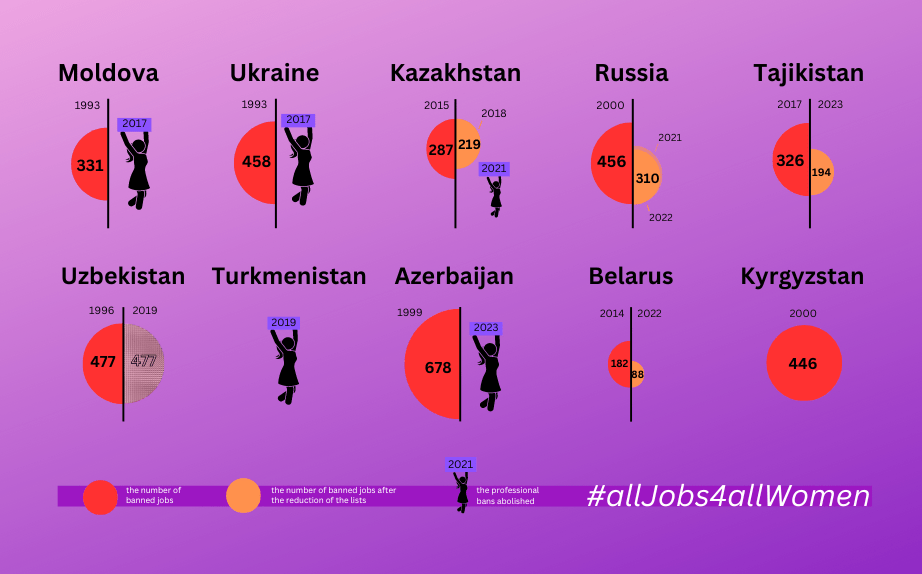Paris, Brussels, Bishkek, 7 March 2024
Until recently, labor laws in many Eastern European and Central Asian States banned women from hundreds of professions. Since 2017, a number of States have abolished these lists of prohibited occupations; in Russia, Belarus and Tajikistan, these lists remain in force, but were significantly shortened. Only in Kyrgyzstan, however, no legislative changes have been introduced so far. On the occasion of International Women’s Day, the International Federation for Human Rights (FIDH) wishes to highlight the #AllJobs4AllWomen campaign of its member organization, ADC Memorial, which led to this groundbreaking success and is aimed at the complete abolition of all professional bans for women in Eastern Europe and Central Asia. Together with the Human Rights Movement Bir Duino Kyrgyzstan and the Coalition for Equality (Kyrgyzstan), the organizations call on the Kyrgyzstani authorities to lift the professional bans for women in Kyrgyzstan.
The #AllJobsforAllWomen campaign, launched 7 years ago in March 2017, is based on the fact that lists of professions prohibited for women, a legacy from the Soviet era, openly discriminate against women in the field of work. The campaign, carried out in ten States of the Eastern Europe and Central Asia region where lists of banned jobs have existed for decades, led to a change of legislation and practices for the better in nine of them.
Some countries demonstrate the best practice, namely removing discriminatory articles from their labor codes and strengthening guarantees for pregnant women and mothers (Moldova, 2017; Kazakhstan, 2021). Other countries have abolished only the lists of prohibited professions as such, while a reference to them still exists in the labor codes (Ukraine, 2017; Uzbekistan, 2019). A number of countries decided to apply professional prohibitions only for pregnant or women who recently gave birth (Azerbaijan, 2023). Some countries chose to gradually reduce the lists without changing their labor codes (Russia, Belarus, Tajikistan).
Even in the one year passed since last March, a big step forward has been made in promoting the goals and objectives of the campaign.

- In 2023, the legislation of Azerbaijan changed, after a list of 678 banned professions (the largest in the region) had been in force in Azerbaijan since 1999. The bans now apply not to all, but only to pregnant women and mothers of children under the age of one year.
- At the very end of 2023, the list of prohibited professions was almost halved in Tajikistan.
- Uzbekistan, where the list of prohibited professions was first abolished (2019), but soon replaced with almost the same “recommendatory” list, in early 2024 took a number of practical steps to bring relevant by-laws in line with the governmental decision to cancel the list. The rules for driver training and licensing have been changed, with women gaining de facto access to work as drivers of trucks or buses.
The UN Committee on the Elimination of Discrimination against Women (UN CEDAW) plays an important role in improving legislation and practices related to gender equality in employment. Considering the state reports of the countries of the Eastern Europe/Central Asia region, the UN CEDAW does not miss the opportunity to recommend the abolition of discriminatory bans, meaning not only legislative changes, but also any effective measures to ensure women’s access to previously prohibited professions and fields of work.
For example, Turkmenistan formally abolished the discriminatory article of the Labor Code on prohibited professions back in 2019, however, no practical steps had been taken to guarantee women’s right to work. This became the subject of criticism by the UN CEDAW during the consideration of the state report of Turkmenistan at the 87th session of the Committee in early 2024.
In some countries, women are already successfully working in jobs that were absolutely inaccessible for them a couple of years ago (for example, in Moscow and Saint Petersburg, women can now drive metro trains). This raises the prestige of women’s work in previously purely “male” areas of employment.
In Eastern Europe and Central Asia, only Kyrgyzstan has not yet undergone any legislative or practical changes to overcome discriminatory professional prohibitions, despite the fact that civil society, including trade unions, and government agencies, such as the Ministry of Labor, Social Security and Migration, have been conducting a constructive dialogue in recent years and have prepared proposals to improve the situation. Kyrgyzstan has just recently ratified ILO Convention No. 190 concerning the elimination of violence and harassment in the world of work; a draft anti-discrimination law is being discussed with the participation of the Coalition for Equality. Against this background, the recommendations of the UN CEDAW to revise the list and to amend the Labor Code (the 80th session, 2021) remain unfulfilled.
The International Federation for Human Rights (FIDH), ADC Memorial, and the Human Rights Movement Bir Duino Kyrgyzstan, with the support of the Coalition for Equality (Kyrgyzstan), call on the Kyrgyzstani authorities to bring its legislation in line with international law, to lift professional bans and to give women a real opportunity to work wherever they want and can.
We also call on all countries in the region to continue fighting discrimination against women in employment, not to allow job refusals or dismissals due to gender characteristics of a person, not to limit the right to vocational education of women, their choice of employment, the type of work or profession, and their career path.









 Feedback
Feedback